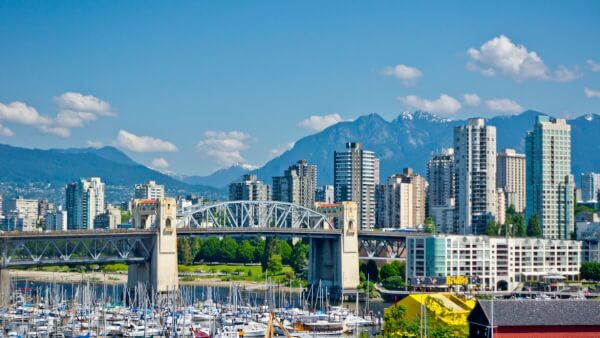RSU tax in Canada: What you need to know
Find out everything you need to know about Canada RSU tax here in our essential guide, including current tax rates.

Canada is the world’s second largest country (and the best educated in the globe, according to the OECD). Additionally, its relatively sparse population and developing economy means it’s also one of the countries most receptive to immigration, with around 250,000 people arriving in Canada to live and work every year.
Canada has thriving cities and unparalleled opportunities for residents to get out into the nature, making it perfect for expats who want to mix hard work with the great outdoors.
If you’re considering moving to Canada for a job, you might need to get a work visa first. Check out this straightforward guide on how to acquire a Canadian work visa, so you can plan your next adventure.
Your first priority should be to figure out if you need a work permit at all. In some cases, depending on your nationality and the role you’re going to take on, a permit might not be necessary.
If you're going to Canada as a business visitor for a short period, or if you’re an artist, member of the clergy, or judiciary, for example, you might not need a visa to work legally.
It's worth reading the fine print when it comes to visa options. The Canadian government website has a form where you can input the work you intend to do and some personal details, and it will quickly inform you if a work visa will be necessary.
Under the Canadian system, you’ll also need a separate visa for entry to Canada. Some countries have a visa free agreement with Canada, but even so, you might have to apply for an electronic travel authorisation (e-TA).
You can find out if you need an e-TA or a visitor visa on the Canadian border authority’s website. The main exception to this policy is currently made for U.S. citizens who can enter freely, while most other nationalities require some form of authorisation to enter the country. Without the right paperwork - even if you have your work visa sorted out - you’ll not be able to board your flight to Canada.
You can apply for your work visa online if you have a credit card as well as a scanner or camera for submitting copies of documents. If not, you can apply by snailmail for most visa types instead. The full details of how to apply for a work visa are available on the Canadian Government website.
The process you follow will depend on the visa type. An open work permit is one type you can apply for if you fulfil the eligibility criteria. This open visa allows you to apply without having secured a job in advance. If you’ve already been offered a job, you’ll need to get documentation from your prospective employer to support your visa application.
Processing times do vary and depend on the type of visa you want and the country you’re applying from. The Canadian Government website provides a processing time estimate for different situations on their website, but on average you can expect it to take several weeks to process your application.
There will be also be fees involved during this application process and the cost does vary enormously depending on your circumstances. For example, a working holiday visa might cost in the region of CAD 200, while a startup visa with residence can hit CAD 1500. The best way to check is to use the online fee calculator on the Canadian Government website.
For skilled workers there's a special program called Express Entry for which you can use the CRS calculator to find out your eligibility.
There are general eligibility requirements you must fulfil regardless of the type of visa that you apply for. These include the fact that you can finance your stay including supporting any family members who accompany you, and that you’ll uphold Canadian law. If you fail any of these criteria you may not be offered a visa or you may have your visa offer revoked.
The documents you need will vary depending on the visa you’re applying for. If you’ve already been offered a job, you’ll need documents from your employer to prove that they have fulfilled their obligations. They should provide:
Or
If you're applying for an open visa, you don’t need to provide these documents.
Whichever visa you’re applying for, you'll need to create an account on the border authority website. With this account, you can keep an eye on the progress of your application for a work permit, and if you need it, the e-TA.
Document checklists are available, to make sure you submit the correct information with your application. Although there’s some variation in the documents needed, depending on the role and the region in which you’ll be working, expect to be asked for:
When you apply you’ll also have to pay the relevant fee and keep a record of payment to support your application.
If you have student visa, you’re eligible to work without any additional permit for up to 20 hours a week in term time and full time in scheduled breaks. There are some additional criteria, such as the duration of course and type of institution you’re attending, all of which can be found on the Canadian government website.
Recent graduates from Canadian educational institutions can apply for an open visa which will allow them to stay and work in Canada after their course has finished. These visas can be issued for up to three years depending on the type of qualification you achieved.
If you’re travelling to Canada to work as a seasonal agricultural worker, there’s a specific visa to cover your needs. As long as your employer is properly registered, they can help you to apply under the Seasonal Agricultural Worker Programme (SAWP).
It’s worth noting that some short term work in specialist fields can be done without a specific work visa. This covers artists, performers, sports people or those working in journalism and some advertising positions, for example. Check the Canadian Government website to find a full list of the roles which can be done visa free.
You can get a visa to work in Canada as an entrepreneur following either the startup visa programme, or by demonstrating that you’ll provide a valuable service through your business by creating employment and improving the local economy. The startup visa is explained in detail on the Canadian Government website. To get this type of visa, there are conditions applied and you must have an invitation from a registered institution.
For either entrepreneurial visa type, you’ll need to submit a self employed ‘job offer’ to the immigration system to start your application. You’ll then have to pay a 230 CAD administration fee and provide the relevant documents to support your application. This process can be completed online in most circumstances.
Once your job offer is processed, additional fees may be applied with a startup visa for someone looking for permanent residence coming in at around 1500 CAD. The exact fee you’ll pay depends on your circumstances, and a handy visa fee calculator can be found online.
If you have a valid visa and hold a role which is classified in the National Occupational Classification system as type 0, A or B, then you might be able to have your spouse join you under an open visa, which will also allow them to work freely in Canada. If this is the case, then your spouse will need to provide a letter from your employer confirming your position and proof of your employment in the form of pay slips/stubs as part of their application.
You can also apply to be a sponsor of family members if you’re a permanent resident of Canada.
The Canadian Government website has lots of information to help you settle in once you arrive. You can find out about accessing language lessons and job boards if you’re coming without a position already secured. There’s also a handy set of FAQs covering all of the usual questions newcomers may have.
To get the most of your money in Canada, you'll want to open a bank account in Canada, which you can do before you arrive.
Once you send money either to or from Canada, consider using a money conversion service like Wise to avoid unfair exchange rates. There's a small transparent fee, and when your money is converted from one currency to another you’ll get the real exchange rate - the same one you can find on Google. Not only that, but Wise receives and sends money via local bank transfers instead of internationally, further saving you money by cutting out hefty international transfer fees.
If your trip is short or opening a bank account in Canada isn't an option, you can always withdraw money from your foreign account using an ATM there. Just keep in mind it'll be more favourable to agree to be charged in the local currency, not your home currency.
Regardless of when you start your new job abroad, it should be fairly straightforward to get yourself a visa if you follow the right steps. The most important part is just to make sure to enjoy your new adventure.
*Please see terms of use and product availability for your region or visit Wise fees and pricing for the most up to date pricing and fee information.
This publication is provided for general information purposes and does not constitute legal, tax or other professional advice from Wise Payments Limited or its subsidiaries and its affiliates, and it is not intended as a substitute for obtaining advice from a financial advisor or any other professional.
We make no representations, warranties or guarantees, whether expressed or implied, that the content in the publication is accurate, complete or up to date.

Find out everything you need to know about Canada RSU tax here in our essential guide, including current tax rates.

Read our helpful guide on how to transfer a UK pension to Canada, including the steps, fees and taxes involved.

Can I keep my Canadian bank account if I move abroad? Find out everything you need to know here in our handy guide.

Thinking of applying for a Canadian passport? Read our guide on the Canada citizenship by investment programme, including the requirements, costs and benefits.

The Great White North is a popular destination for tourists from all over the world, as well as expats. With its progressive politics, stunning natural...

Your essential guide to moving to Canada from the UK, including visas, money, finding a place to live and more.